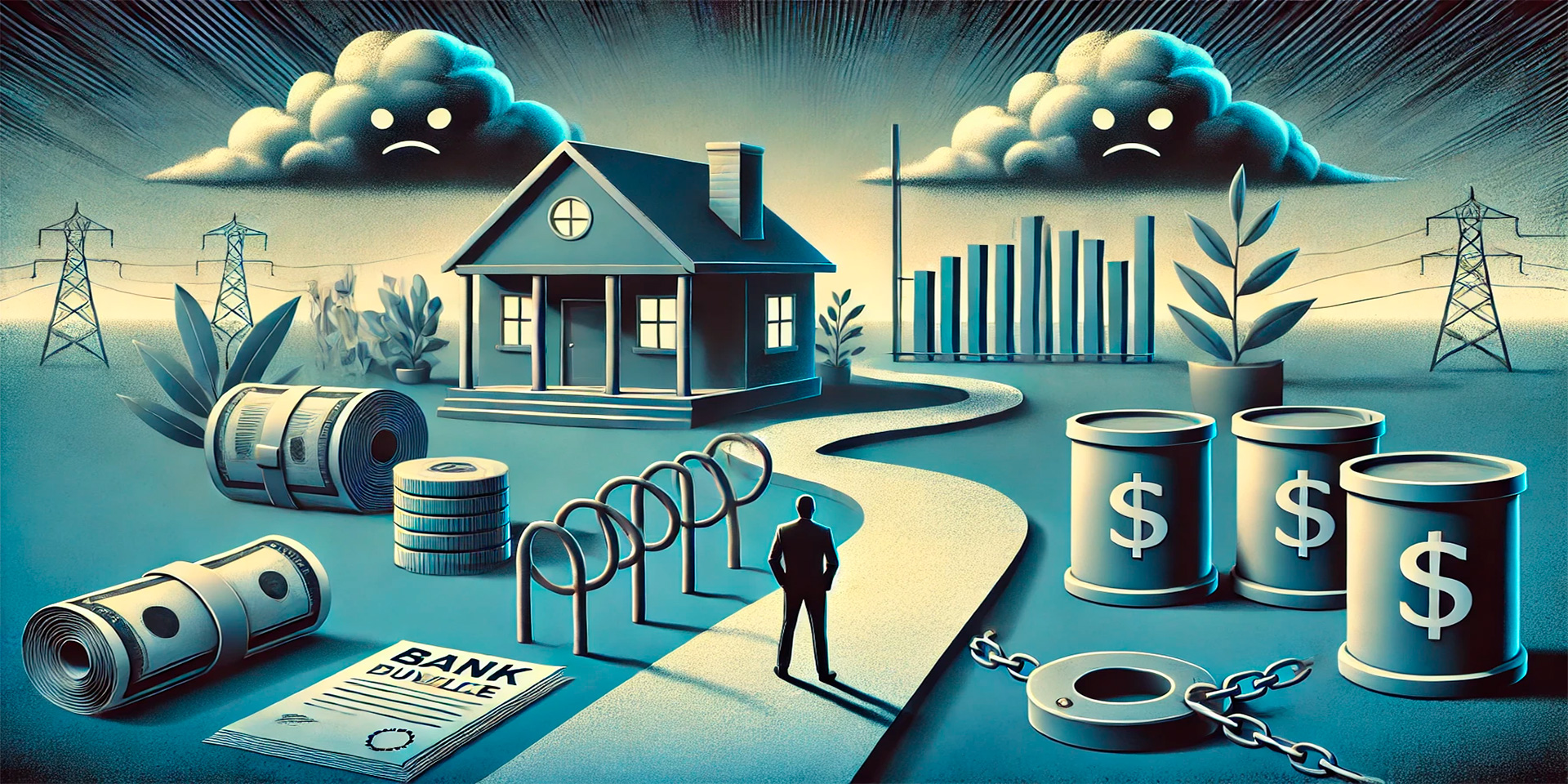Economic crises can create significant challenges for homebuyers, particularly when it comes to securing a mortgage. During times of economic uncertainty, lenders often tighten their lending standards, making it more difficult for potential buyers to qualify for favorable mortgage terms. However, securing a mortgage during a crisis is not impossible. With the right strategies, preparation, and understanding of the market, you can improve your chances of getting approved for a home loan and still find a home that fits your needs and budget.
In this guide, we’ll explore how economic downturns affect mortgage approvals and share actionable tips for homebuyers looking to navigate the mortgage process during uncertain financial times. Understanding the landscape and taking proactive steps can help you overcome the hurdles of securing a mortgage during an economic crisis.
Understanding How Economic Crises Affect Mortgage Approvals
During economic crises, lenders face greater risks due to financial instability, which can lead to higher unemployment rates, reduced incomes, and fluctuations in home values. As a result, lenders typically tighten their mortgage approval criteria to minimize their exposure to potential defaults. Borrowers may face stricter credit score requirements, higher down payments, and more thorough income verification processes. Additionally, interest rates may fluctuate, making it harder to lock in a favorable mortgage rate.
The uncertainty that comes with economic crises can also impact consumer confidence. Many potential buyers may delay purchasing a home due to concerns about job security or the future value of real estate. This hesitancy can lead to a slower housing market, though it can also present opportunities for buyers who are able to secure financing and find favorable deals on homes.
Stricter Lending Standards
One of the biggest challenges homebuyers face during an economic crisis is stricter lending standards. Lenders become more cautious, often raising the minimum credit score required for approval and increasing down payment requirements. Borrowers with lower credit scores or inconsistent income may find it more difficult to qualify for a mortgage. Even those with strong credit may face more scrutiny during the approval process as lenders try to reduce their risk.
Volatile Interest Rates
Interest rates can become more volatile during times of economic instability. While central banks may lower interest rates to stimulate the economy, individual mortgage rates may fluctuate based on lender risk assessments and market conditions. Buyers should pay close attention to interest rate trends and consider locking in a rate early if they find a favorable option. However, it’s important to remain flexible, as rates can shift unexpectedly during a crisis.

Tips for Securing a Mortgage During Economic Crises
Despite the challenges that come with economic downturns, there are several strategies homebuyers can use to improve their chances of securing a mortgage. By preparing your financial profile, improving your credit score, and exploring alternative loan options, you can navigate the mortgage process more successfully and secure favorable terms for your home loan.
1. Strengthen Your Credit Score
Your credit score is one of the most important factors lenders consider when approving a mortgage. During an economic crisis, lenders may raise their minimum credit score requirements, meaning that a higher credit score is essential to securing a mortgage with favorable terms. If your credit score is on the lower end, take steps to improve it before applying for a loan.
To boost your credit score, start by reviewing your credit report for any errors or inaccuracies. Dispute any incorrect information to ensure your score accurately reflects your financial history. Additionally, focus on paying down credit card balances and reducing your debt-to-income ratio. Avoid taking on new debt or applying for multiple loans, as this can negatively impact your credit score.
2. Save for a Larger Down Payment
During economic crises, lenders often require larger down payments to offset the increased risk of lending. While conventional loans typically require a down payment of at least 20%, some lenders may require higher amounts during uncertain economic times. Saving for a larger down payment not only improves your chances of loan approval but also reduces your loan-to-value (LTV) ratio, making you a more attractive borrower.
A larger down payment can also help you avoid private mortgage insurance (PMI), which is typically required for loans with an LTV ratio above 80%. By putting down more money upfront, you can reduce your monthly mortgage payments and lower the total cost of the loan over time.
3. Provide Strong Proof of Income
Lenders are particularly cautious about income verification during economic downturns. If you’re applying for a mortgage, be prepared to provide thorough documentation of your income and employment history. This may include pay stubs, tax returns, bank statements, and letters from your employer verifying your job stability.
If you’re self-employed or have variable income, securing a mortgage can be more challenging. In this case, lenders may require additional documentation to prove the consistency of your income. Make sure to keep detailed records of your earnings, and consider working with a lender who has experience dealing with self-employed borrowers.
4. Lower Your Debt-to-Income Ratio
Your debt-to-income (DTI) ratio is another important factor lenders assess when determining your mortgage eligibility. A high DTI ratio signals that you may have difficulty managing additional debt, making lenders more hesitant to approve your loan. During a financial crisis, lenders may impose stricter DTI ratio limits, so it’s essential to reduce your debt before applying for a mortgage.
To lower your DTI ratio, focus on paying off existing debts such as credit card balances, auto loans, and personal loans. Reducing your debt obligations not only improves your financial health but also makes you a more attractive candidate for a mortgage.
5. Explore Government-Backed Loan Programs
Government-backed loan programs, such as FHA, VA, and USDA loans, are often more accessible for homebuyers during economic crises. These programs are designed to help individuals secure affordable home loans, particularly those who may not qualify for conventional mortgages due to lower credit scores or limited down payments.
FHA loans, for example, are backed by the Federal Housing Administration and offer more lenient credit score and down payment requirements. VA loans, available to veterans and active-duty military personnel, offer competitive interest rates with no down payment required. USDA loans are designed for buyers in rural areas and may offer zero down payment options for qualified borrowers.
6. Shop Around for Lenders
During an economic crisis, it’s more important than ever to shop around for the best mortgage terms. Different lenders may offer varying interest rates, loan terms, and approval criteria, so comparing multiple offers can help you find the most favorable option. Be sure to explore both traditional banks and alternative lenders, such as credit unions or online mortgage providers, which may offer more flexible terms.
While shopping for a mortgage, keep in mind that each lender will perform a hard inquiry on your credit report, which can temporarily lower your credit score. To minimize the impact on your credit, aim to complete your mortgage shopping within a 30-day window, as multiple inquiries during this period will typically be treated as a single inquiry by credit scoring models.
7. Consider Locking in a Low Interest Rate Early
Interest rates can fluctuate rapidly during times of economic uncertainty, and securing a low rate early can save you thousands of dollars over the life of your mortgage. Many lenders offer the option to lock in an interest rate for a set period, usually between 30 to 60 days. If you find a favorable rate, consider locking it in to protect yourself from potential rate increases before closing on your home.
However, be mindful of any fees associated with locking in a rate. Some lenders charge fees for extending rate locks, especially if your closing date is delayed. Make sure to clarify the terms of the rate lock with your lender before committing.
8. Be Flexible with Your Homebuying Timeline
Economic crises can create uncertainty in the housing market, leading to slower home sales and fluctuating prices. While this may seem discouraging, it can also present opportunities for buyers who are able to act quickly. Being flexible with your homebuying timeline allows you to take advantage of market conditions, such as lower home prices or seller incentives.
If you’re able to wait for a more favorable market environment, consider delaying your purchase until interest rates stabilize or housing inventory increases. On the other hand, if you’re in a strong financial position and find a great deal on a home, moving quickly can help you secure a good price before the market shifts again.

What to Do If You’re Struggling to Get Approved
If you’re having difficulty getting approved for a mortgage during an economic crisis, don’t give up. There are still several steps you can take to improve your chances of securing a loan. First, consider working with a mortgage broker, who can help you find lenders with more flexible approval criteria. Brokers have access to a wide network of lenders and can match you with the right loan product based on your financial situation.
Additionally, if you’ve been rejected for a mortgage, ask the lender for feedback on why your application was denied. Understanding the reasons behind the rejection can help you address any issues and improve your financial profile before reapplying. In some cases, taking a few months to improve your credit score, reduce debt, or save for a larger down payment can make a significant difference in your chances of approval.
Improve Your Credit and Reapply
If your credit score is holding you back from securing a mortgage, focus on improving it before reapplying. Pay down outstanding debts, avoid opening new credit accounts, and ensure that all your bills are paid on time. Even small improvements to your credit score can increase your likelihood of approval and help you secure better mortgage terms.
Consider a Co-Signer
If your financial situation isn’t strong enough to qualify for a mortgage on your own, you may want to consider applying with a co-signer. A co-signer with a strong credit history and stable income can help you meet the lender’s approval criteria, increasing your chances of securing a loan. Keep in mind that a co-signer is equally responsible for the loan, so it’s important to choose someone who understands the risks involved.
Conclusion: Navigating the Mortgage Process During Economic Crises
Securing a mortgage during an economic crisis may require extra effort, but with careful preparation and the right strategies, homebuyers can still qualify for favorable loan terms. By improving your credit score, saving for a larger down payment, and exploring government-backed loan programs, you can increase your chances of approval and navigate the challenges of the mortgage market during uncertain times.
While economic downturns can create hurdles in the homebuying process, they also present opportunities for buyers who are financially prepared and able to act quickly. By staying informed, being flexible, and shopping around for the best mortgage options, you can successfully secure a home loan and make your homeownership dreams a reality even during tough economic times.

